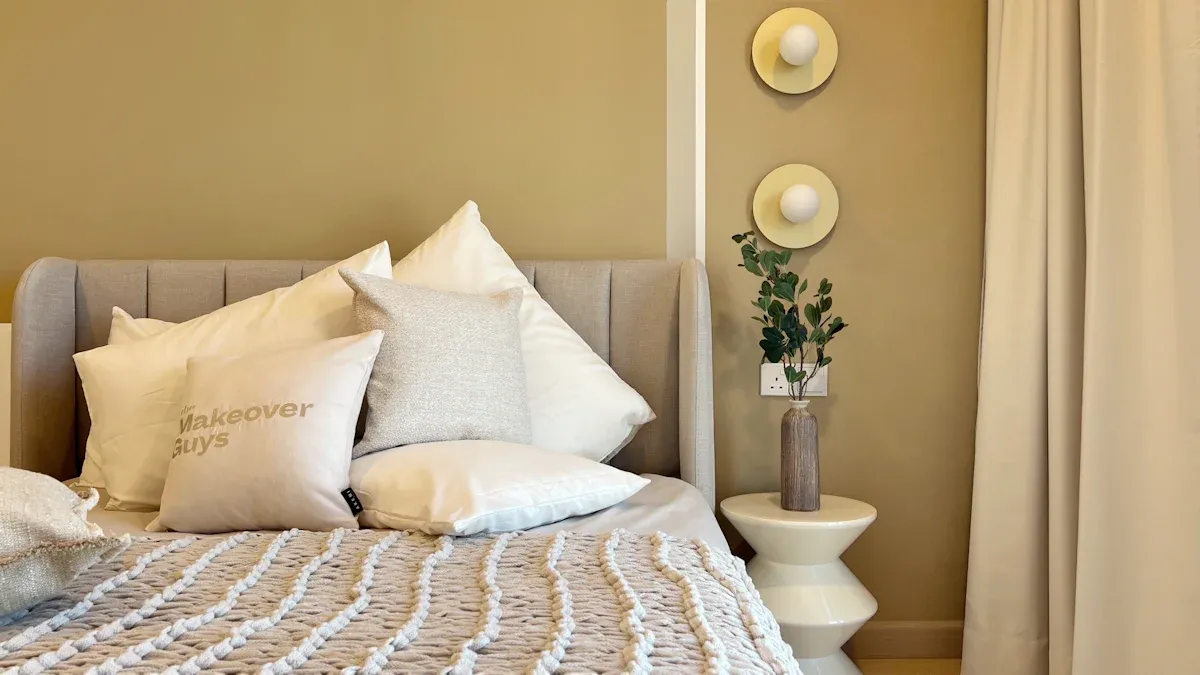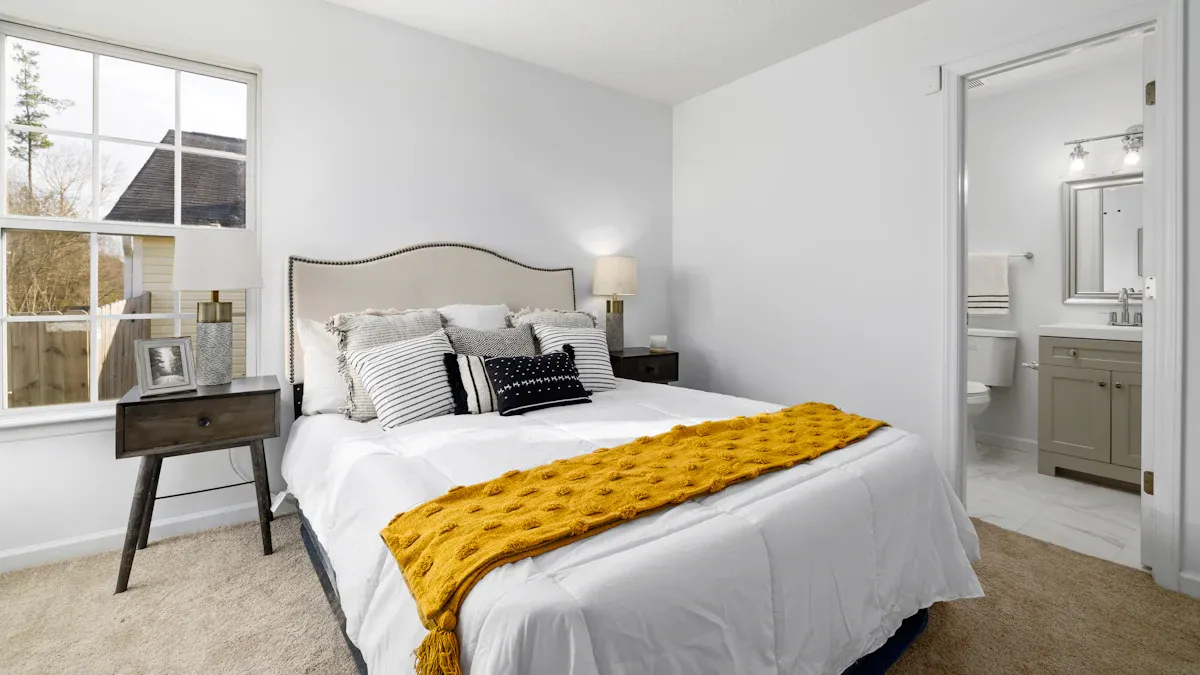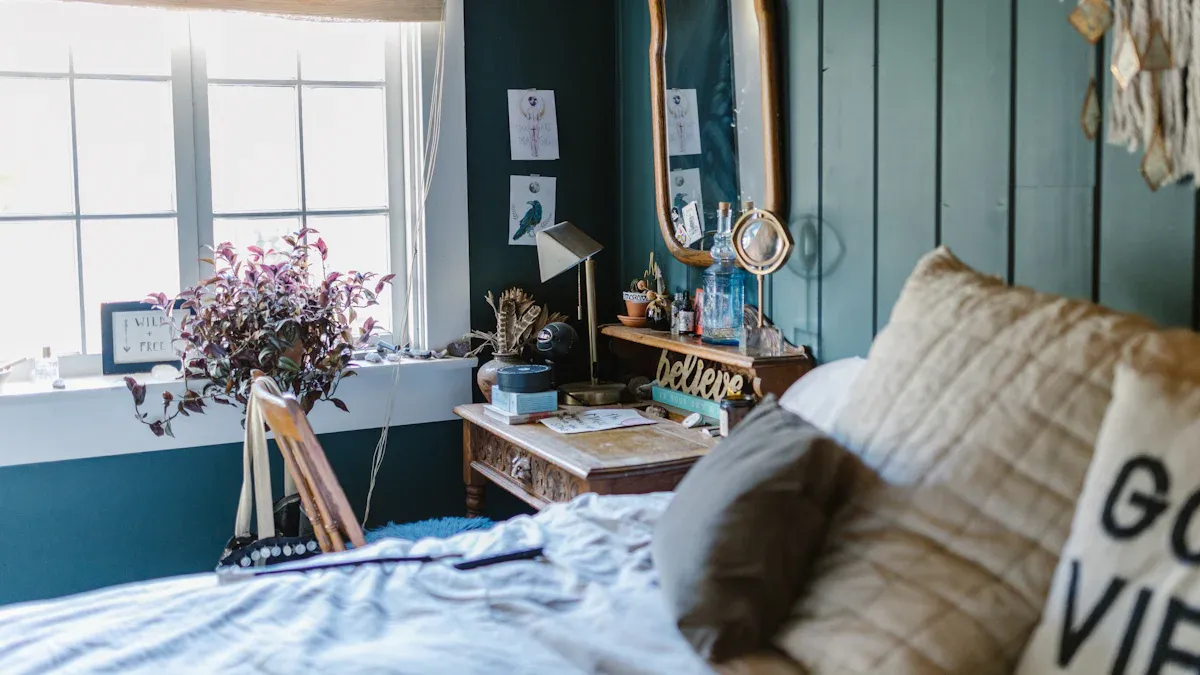
How to Apply Essential Feng Shui Rules in Your Bedroom

Arranging your bedroom with essential feng shui rules helps you make a space that supports good sleep, calm, and positive energy. When you set up your bedroom like this, you bring in good energy that helps your health and well-being. Studies show that a bedroom with feng shui ideas can help your mood, heart rate, and comfort. If you want better sleep, a peaceful room, or easy ways to feel more relaxed, bedroom feng shui rules can help your daily energy. (To understand the foundational concepts and significance of feng shui within Taoism, check out What is Fengshui and Why Fengshui is Important in Taoism. This article offers valuable insights into the spiritual dimensions of this ancient practice.)
Key Takeaways
Put your bed where you can see the door, but do not line it up with the door. This helps you feel safe and in control.
Keep your bedroom neat and clean. A tidy room lets good energy, or Qi, move easily. This helps you relax and sleep better.
Pick soft colors like blue or green for your room. These colors make the room peaceful. They help lower stress and help you sleep well.
Make your bedroom look even on both sides. Use matching nightstands and lamps for balance. This helps you feel good emotionally.
Do not keep many electronics in your bedroom. Fewer distractions make the room calm. This helps you relax and sleep easier.
Bedroom Feng Shui Basics

What Is Feng Shui?
Feng shui is an ancient Chinese practice that helps you arrange your space to create balance and harmony. When you use feng shui principles in your bedroom, you focus on how energy, called Qi, moves through your room. This energy affects how you feel, sleep, and relax.
Feng shui is different from other design styles. Most interior design focuses on how things look or work. Feng shui rules help you set up your bedroom to support the flow of positive energy. This flow, called Qi, brings peace and comfort to your space.
You can see the roots of feng shui in history. People have used these ideas for thousands of years. Here are some early examples:
Evidence |
Description |
|---|---|
Yangshao and Hongshan cultures |
Used feng shui ideas as early as 4000 BC. |
Banpo dwellings |
Built homes to catch sunlight, showing early feng shui thinking. |
Dadiwan site |
Had buildings lined up north to south, showing planning for energy flow. |
Puyang grave |
Used mosaics facing north-south, showing beliefs about energy in burial. |
Liuren astrolabes |
Ancient tools from 278 BC to 209 BC, used for feng shui and watching the stars. |
Cosmography on jade |
Found at Hanshan, around 3000 BC, showing early feng shui devices. |
Capital city designs |
All Chinese capitals followed feng shui rules, written in books like the Kaogong ji. |
Feng shui principles for your bedroom include:
Bed Placement: Put your bed where you can see the door, but not right in front of it. This helps you feel safe.
Five Elements: Use wood, fire, earth, metal, and water in your room to create balance.
Clutter-Free Environment: Keep your space tidy so Qi can move easily and help you feel better.
Why Bedroom Feng Shui Matters
You spend a lot of time in your bedroom. The way you set it up can change how you sleep and feel. Feng shui principles help you make your bedroom a place where you can rest and recharge.
Experts say that Qi comes from three places:
Earth Qi: Comes from the ground and helps your room feel stable.
Heaven Qi: Comes from the sky and stars, bringing new energy.
Human Qi: Comes from you and the way you live in your space.
When you follow feng shui rules, you help all three types of Qi work together. This makes your bedroom feel calm and safe.
Recent studies show that using bedroom feng shui can help you sleep better and feel happier. One study found that people who use feng shui principles in their bedrooms feel more well-being and get better sleep.
You do not need to believe in magic to see results. Architects agree that bed placement and a tidy room make a big difference. Feng shui rules are not just old ideas—they work in real life.
Bedroom Feng Shui Rules
Bed Placement
When you set up your bedroom, bed placement is the first thing you should think about. The bed is the heart of your space. It affects your health, romance, and abundance. You want your bed in a commanding position. This means you can see the door from your bed, but you do not want your bed lined up directly with the door. This setup helps you feel safe and in control. If you sleep under a slanted ceiling, you might feel compressed energy, which can bring bad luck. People have noticed a big change in their energy and spiritual life after moving their bed to a better spot.
Here are some tips for bed placement:
Put your bed so you have a clear view of the entrance.
Keep your bed away from direct alignment with the door.
Place the headboard against a solid wall for support.
Make sure there is space on both sides of the bed for balance.
If you cannot see the door, use a mirror to help you watch the entrance.
A well-placed bed creates a calm atmosphere. It helps you get restful sleep and boosts your mood. You will notice more positive energy and vitality in your bedroom.
Headboard Importance
The headboard is more than just decoration. It gives you a sense of security and stability. A solid headboard attached to your bed supports you while you sleep. It helps keep the energy steady in your bedroom. When you choose a headboard, pick one that feels strong and safe. This will help you relax and enjoy restful sleep.
Solid headboards promote positive energy flow.
They make your bedroom feel stable and secure.
Designs matter—choose simple, sturdy styles for the best results.
Symmetry and Balance
Balance is key in bedroom feng shui rules. You want both sides of your bed to look and feel equal. This helps energy move smoothly and keeps relationships strong. Try using matching nightstands, lamps, or artwork on each side of the bed. Even if you sleep alone, symmetry brings emotional balance.
Example |
Description |
|---|---|
Matching Nightstands |
Promotes emotional equilibrium, even for solo sleepers. |
Symmetry in Bedroom |
Nightstands, sconces, or artwork on both sides of the bed enhance harmony. |
Mid-Century Nightstand w/LED |
Combines function and energy flow, supporting peaceful Qi. |
When you organize your bedroom with symmetry, you create a harmonious space. This makes it easier for positive energy to fill the room.
Decluttering
A clutter-free zone is essential for good energy. Clutter blocks Qi and makes it hard to relax. Studies show that removing clutter lowers stress and helps you feel stable. Women with more clutter in their homes have higher cortisol levels, which makes it harder to unwind. An organized bedroom helps you process information and gives you a sense of control.
You should also declutter beneath the bed. Feng shui experts say that storing things under your bed can block energy while you sleep. If you must store items, keep only soft things like extra pillows or bedding. Avoid putting emotionally charged items, such as old tax returns or mementos, under your bed. This simple step helps cleanse your bedroom and lets positive energy flow freely.
Tip: Make decluttering a regular habit. You will notice more relaxation and better sleep. Discover more about the impact of spatial arrangements on your well-being by reading Why Feng Shui Bedroom Layouts Lead to Better Sleep and Health. This exploration underscores the importance of thoughtful design in achieving restorative rest.
Colors and Materials
Colors play a big role in bedroom feng shui rules. Soft, calming colors help you relax and get restful sleep. Blue brings calm and longer sleep. Green reminds you of nature and reduces anxiety. White and light gray make your space feel peaceful and open. Beige and cream are cozy and gentle on your eyes. Light pink adds comfort and warmth.
Color |
Calming Effect Description |
|---|---|
Blue |
Evokes calm and serenity; linked to restful sleep. |
Green |
Brings tranquility; helps reduce anxiety and promotes wellbeing. |
White/Light Gray |
Creates a peaceful ambiance; makes small spaces feel airy. |
Beige/Cream |
Inviting and cozy; gentle for sleep-friendly environment. |
Light Pink |
Promotes comfort and warmth, aiding relaxation. |
Natural materials like wood, bamboo, rattan, or stone add warmth and texture. They connect you to the earth and help ground your energy. This connection is important for creating a relaxing bedroom. To further enhance the tranquility of your bedroom, explore How to Choose the Best Feng Shui Bedroom Colors for Relaxation and Harmony. This article will help you select hues that promote peace and balance.
Mirrors and Electronics
Mirrors can help guide positive energy, but you need to place them carefully. Do not put a mirror directly facing your bed. This can disrupt your sleep and bounce energy around. Avoid placing mirrors across from the bedroom door, as this sends good energy out of the room. Side walls are better for mirrors. Round mirrors bring harmony, while square ones offer stability.
Electronics can disturb the natural energy in your bedroom. They give off active, yang energy, which makes it hard to relax. Too many electronics create clutter and stress. To follow bedroom feng shui rules, reduce electronics in your space. Keep your bedroom calm and peaceful for better sleep.
Lighting and Natural Elements
Lighting sets the mood in your bedroom. Use soft, warm lights instead of one bright light. Lamps with fabric or paper shades create a gentle glow. Try using table or floor lamps near your bed for flexibility. Rounded shades with orange or red light can promote success. Mix direct and indirect lighting to adjust the atmosphere.
Natural elements like plants or small water features boost positive energy. Plants symbolize growth and prosperity. They help the flow of Qi and make your bedroom feel fresh. Water features, like a small fountain, bring wisdom and insight. Just remember to keep water balanced, so it does not overwhelm the space.
Note: Adding natural elements and soft lighting helps you relax and enjoy restful sleep.
Feng Shui Dos and Don’ts
Dos
Want to make your bedroom feel calm and restful? Try these simple tips:
Place your bed in a commanding position. You should see the door from your bed, but don’t line up directly with it. This helps you feel safe and in control.
Rest the head of your bed against a solid wall. This gives you a sense of protection and helps you relax at night.
Keep the area under your bed clear. When you cut out distractions and clutter, you let Qi flow freely and support better sleep.
Use matching nightstands or lamps on both sides of the bed. This brings balance and harmony to your space.
Minimize electronics in your bedroom. Less technology means fewer distractions and more peaceful energy.
Choose soft, calming colors and natural materials. These choices help you unwind and feel grounded.
Many people say these tips make their rooms feel more peaceful. You spend a lot of time in your bedroom, so a calm space can really boost your mood and help you sleep well.
Don’ts
Some habits can block good energy and make it hard to relax. Watch out for these common mistakes:
Don’t put mirrors facing your bed. This can disturb your sleep and bounce energy around the room.
Avoid placing your bed under a beam or window. These spots can create pressure or make you feel exposed.
Skip water features in the bedroom. Moving water can bring restless energy and emotional ups and downs.
Don’t keep too many books, work materials, or electronics in your bedroom. These items create distractions and remind you of tasks.
Watch out for sharp corners pointing at your bed. These “poison arrows” send harsh energy your way.
Don’t let clutter build up under your bed. Stagnant energy here can disrupt your sleep and make it hard to relax.
If you avoid these don’ts, you’ll notice fewer distractions and a more restful space. Removing clutter and electronics helps you relax and recharge every night. For a comprehensive guide on what to embrace and avoid for optimal energy flow, refer to Feng Shui Bedroom Dos and Don'ts for a Balanced Space. This resource deepens your understanding of how to create a harmonious sleep environment.
Enhance Relaxation and Relationships

Restful Atmosphere
You want your bedroom to feel like a calming sanctuary. Feng Shui experts share some simple tips to help you create an ideal sleep sanctuary. Try these relaxing bedroom ideas:
Choose soft colors, like blue or aqua, for a soothing effect. Earth tones such as tan and taupe also help set a peaceful atmosphere.
Place your bed so you can see the door, but don’t line up directly with it. This makes you feel safe and lets positive energy flow.
Add shapes that remind you of calmness, like gentle waves or squares, to boost the tranquil atmosphere.
Use different lighting options with dimmers. Soft lights help you wind down before sleep.
You can also keep the area under your bed clear. Limit what you keep on your nightstand. Remove distractions, such as electronics or piles of books. These small changes help Qi move freely and support your well-being.
A relaxing bedroom helps you let go of stress and enjoy better sleep. Studies show that arranging your space with Feng Shui can improve your mood and long-term well-being.
Try adding gentle fabrics, neutral colors, and a few plants. Natural light and symmetry in your furniture bring balance and harmony to your space.
Relationships
Your bedroom is more than just a place to rest. It can also support your relationships and emotional health. Feng Shui focuses on creating a balanced space that helps love and connection grow.
Spend time making your bedroom a calming sanctuary. This helps both you and your partner relax and connect.
Use matching furniture on both sides of the bed. This simple step promotes equality and partnership.
Declutter your space. A tidy room reduces stress and helps you feel more patient and understanding.
Avoid mirrors facing the bed. Experts say this can bring negative energy and affect your relationship.
Choose soft lighting and calming colors. These bring Yin energy, which supports intimacy and comfort.
A harmonious bedroom can help you feel closer to your partner. When you create a peaceful atmosphere, you both benefit from less stress and more positive energy. Even small changes can make your bedroom an ideal sleep sanctuary and a place where your relationship can thrive.
When you use feng shui rules in your bedroom, you set yourself up for better sleep, more relaxation, and a peaceful mood. Start with one small change, like moving your bed or clearing clutter. Build on your progress each week. Want a quick win? Try a simple checklist to keep you on track. You can create a space that feels calm and supports your best self every day.
FAQ
What if my bedroom is small and I can’t move my bed?
You can still use Feng Shui. Place your bed so you see the door. Keep the area tidy. Use soft colors and natural materials. Even small changes help Qi flow better.
Can I have plants in my bedroom?
Yes, you can! Plants bring fresh energy and help Qi move. Choose small, healthy plants. Avoid spiky or thorny ones. Keep them clean and happy for the best results.
Is it okay to have a TV in the bedroom?
It’s better to keep electronics out. TVs and other devices create active energy. This can make it hard for you to relax and sleep. If you must have a TV, cover it at night.
Do I need to follow every Feng Shui rule perfectly?
No, you don’t. Start with a few simple changes. Focus on what feels right for you. Feng Shui is about balance and comfort. You can always adjust things as you go.
See Also
Feng Shui Bedroom Dos and Don'ts for a Balanced Space
How to Choose the Best Feng Shui Bedroom Colors for Relaxation and Harmony
Why Feng Shui Bedroom Layouts Lead to Better Sleep and Health





